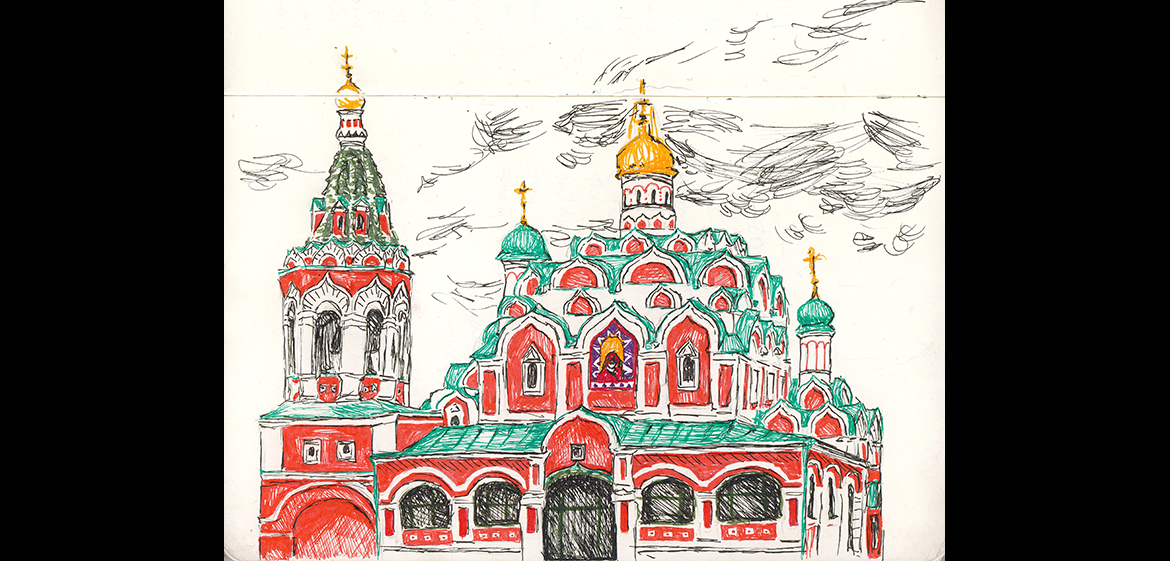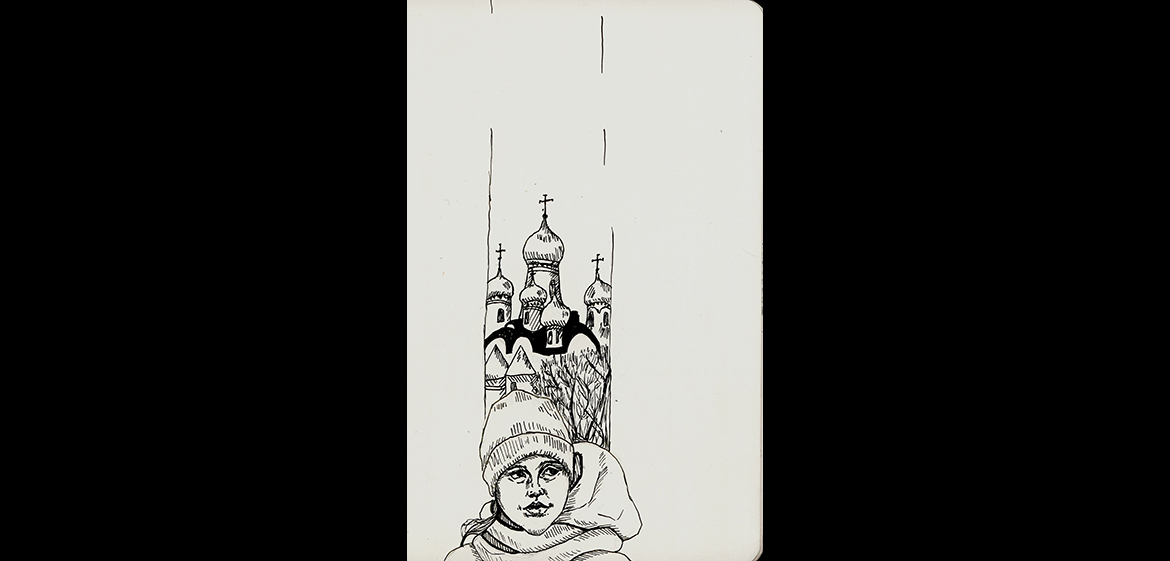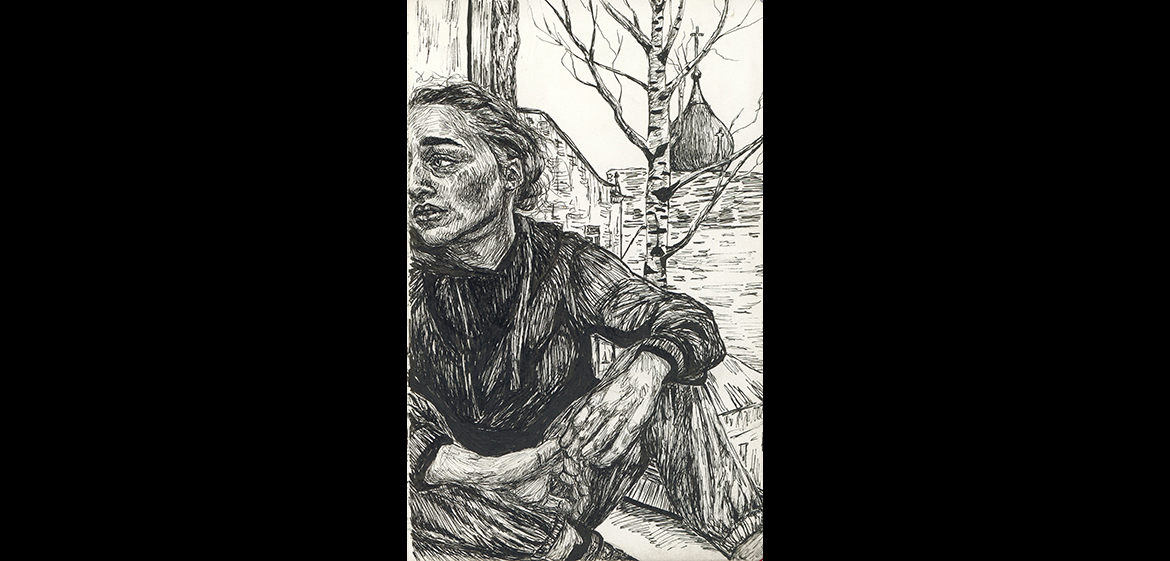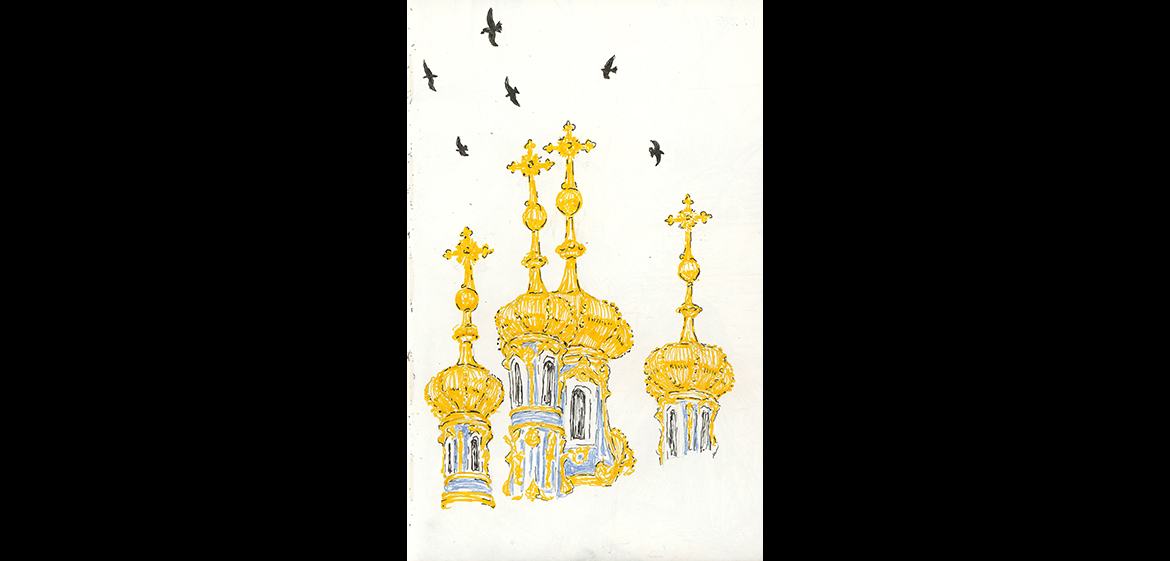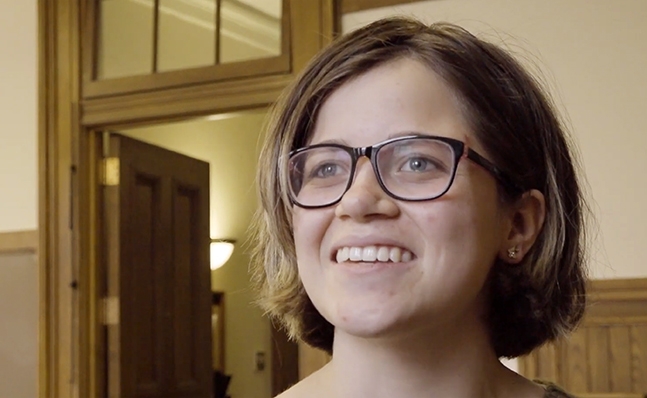Russian, East European & Eurasian Studies

Russia, Eurasia and Eastern Europe significantly influence the politics, economy and culture of our global society. Since the end of the Cold War and the fall of Communism, the study of Russia, along with Ukraine, Eastern and Central Europe, the Balkans, Central Asia and the Caucasus, has taken on increased importance. Occupying more than one quarter of the world’s land surface and home to diverse cultures, this region is continuing to undergo major social, economic and political transformation.
The Program in Russian, East European and Eurasian Studies at Smith College coordinates curricular offerings, supports students’ international studies and organizes campus events that let students explore the complex history and contemporary developments of this exciting and ever-changing part of our world.
Announcements
Browse course offerings
Fall 2023 REEES and REEES cross-listed courses can be found by going to the Registrar's course search.
Russian Table
Russian language table meets every Friday at lunch in Duckett (dining room C). When remote, the table meets by Zoom at this link. Please let me know if you have any questions. I look forward to seeing you there!
Ilona Sotnikova (isotnikova@smith.edu)
Students in REEES are expected to learn to think critically about the histories, cultures, religions, politics and economies of the region of the former Soviet Union, as well the often competing ideas and interests that have shaped these histories and cultures for the past thousand years.
Language competency:
- Students are expected to be able to function independently in a Russian or East European-speaking milieu. While currently only Russian is offered at Smith, students who wish to focus their studies on Eastern Europe may do so through pursuing language training through the Five College Center for the Study of World Languages, summer study, etc. Linguistic competency is evaluated on the basis of nationally accepted testing practices.
Cultural and cross-cultural competency:
- Graduating students majoring in REEES are able to choose one of two tracks of study: language and literature or broader area studies. In either case, students are expected to develop a working knowledge of the history of Russia or Eastern Europe and the ways in which literature, the visual or performing arts, religion and other modes of human expression have reflected and shaped that history.
- Students are expected to be aware of the intellectual, social and political questions that have influenced Russian, East European or other post-Soviet societies, and be able to contextualize these questions both regionally and cross-culturally.
- Students also develop familiarity with non-Russian cultures and traditions of Eurasia and their global influence.
- Students are expected to become critical thinkers and participants in ongoing conversations about the ways in which Russia and other post-Soviet societies in Eastern Europe and Central Asia contribute to and challenge broader conversations regarding nationalism, transnationalism and imperialism, relations between state and religion, globalization and human rights, majority and minority relations, race, gender, sexuality, etc.
Research competency:
- Students are expected to develop the research skills necessary to explore key issues in cultures, religions, histories and politics of post-Soviet societies using a variety of primary and secondary sources.
Global citizenship competency:
Students are expected to use their linguistic, cultural and research skills to become informed and engaged citizens of the world
Advisers: Sergey Glebov, Thomas Roberts, Vera Shevzov
The major in Russian, East European and Eurasian Studies (REEES) allows students to focus on any aspect of the region’s histories, literatures, cultures, religions, or politics, and to develop their own concentration within the major in consultation with their advisor. In developing their concentration, students are encouraged to pursue an interdisciplinary approach, combining coursework in language, government, history, literature, and religion. Students may choose from courses offered both at Smith and through the Five College Consortium; students are also encouraged to study abroad during a summer, semester, or year-long program.
The REEES Program is committed to accommodating students who coordinate their studies in REEES with a second major.
In order to help guide students in developing their concentrations, the REEES Program offers two tracks: 1) Area Studies; 2) Language and Literature.
Area Studies Track
Students who choose the Area Studies Track will gain a working understanding of the history and culture of Russia, Eastern Europe, and Central Asia, and the geopolitical significance of this region in today’s global world. Students will acquire advanced proficiency in Russian or another language relevant to the region. By pursuing coursework in a broad array of disciplines, students will gain an appreciation for the different methodological approaches scholars use in their study of this highly diverse and dynamic region of the world.
The Area Studies track consists of 11 courses, which include the following requirements:
- Four semesters of language instruction, usually fulfilled by taking RES 100Y (a year-long introductory course to the Russian language) or RES 120 (an intensive 8-credit semester-long course which covers a year of Russian), and RES 220 and RES 221 (the combination of which is equivalent to second-year Russian). Students are welcome to pursue the study of another language relevant to the region. Students who place out of first- or second-year Russian (or other relevant language) will consult with their advisor or Program Director on how best to fulfill the four-semester language instruction requirement.
Students are highly encouraged to continue the study of Russian (or another language of the region), especially in a study abroad program, in order to achieve an advanced level of fluency. Credits earned in study-abroad language courses may count toward the fulfillment of the major requirements.
- Six semester (4-credit) courses, at least one of which will include a semester course taught in Russian (equivalent to RES 331) or another relevant language. In developing their area of concentration, students are strongly encouraged to seek out courses that span a broad range of disciplines, including anthropology and sociology, art and film, government/political science/international relations, history, literature, and religion.
- A 300-level seminar, a research-based Special Studies, or a Senior Honors Thesis (which is a year-long project that counts as two courses).
Language and Literature Track
The Language and Literature Track provides the opportunity for students to focus closely on the language, literature, and cinema of Russia, Eastern Europe, and Eurasia. Students are expected to achieve advanced proficiency in Russian or another relevant language, and to engage closely with works of literature and film in the original language of study. While focusing on the language, literature, and cinema of one or more culture in the region, students in this track are also encouraged to explore correlated disciplines represented in the REEES curriculum.
The Language and Literature track consists of 11 courses, which include the following requirements:
- Six semesters of language instruction in Russian, or another relevant language of the region. For Russian, this will usually be fulfilled by taking RES 100Y (a year-long introductory course to the Russian language; this may also be fulfilled by taking the equivalent RES 120, an intensive single-semester course), RES 220 and RES 221 (the combination of which is equivalent to second-year Russian), and RES 331 and RES 332 (the combination of which is equivalent to third-year Russian). Students who place into a higher level of Russian or another language, on the basis of existing knowledge, will consult with their advisor or Program Director on how best to fulfill the six-semester language instruction requirement.
While six semesters of language instruction in Russian, as well as courses in other languages of the region, are normally offered at Smith or in the Five Colleges, students in the Language and Literature track are highly encouraged to enroll in a study abroad program (or comparable program in the United States). Credits earned in these language courses will count toward the fulfillment of the Major requirements, while they may also provide the opportunity for students to achieve a higher proficiency in the language.
- Four semester (4-credit) courses in literature or film, only one of which will normally be at the 100-level. Normally, one of these course will be in nineteenth century literature. Of the four courses students may also choose one from the list of approved REEES courses in other disciplines.
- A 300-level seminar, a research-based Special Studies, or a Senior Honors Thesis (which is a year-long project that counts as two courses).
Additional Guidelines for the Major
- Some of the most prominent scholars in the field of REEES teach in the Five College Consortium (Amherst College, Hampshire College, Mount Holyoke College, and UMass), and students are encouraged to take advantage of the rich REEES offerings available on the other campuses. Please consult the Five College REEES webpage for a given semester to see a current list of approved courses.
- Courses taken while studying abroad or at an accredited institution during the summer may be counted toward the major. Students should consult with their advisors prior to embarking on such courses, as well as check with the Smith Registrar’s office regarding the possibility of transfer of credits. Upon completion of such a course, students must petition the REEES Advisory Committee to count these courses. Students are advised to submit the syllabus and any relevant completed work for the course with their petitions.
- No course counting toward the major may be taken as an S/U grade.
The minor is structured to offer students interdisciplinary breadth as well as the opportunity to pursue a particular area of interest within the field of REEES in more depth.
Requirements consist of six 4-credit courses, which include two semesters of language study in addition to four 4-credit REEES-approved courses:
- Language requirement: RES 100Y (a year-long introductory course to the Russian language) or RES 120 (an intensive 8-credit semester-long course which covers a year of Russian). Students electing to study another Eastern European or Eurasian language must complete the equivalent of two semesters of college study.
- Breadth requirement: Three 4-credit courses in three of the following fields: a) government, politics, or another field in the social sciences; b) history; c) literature, art, film and media studies, music; or d) religion. Normally, no more than one of these courses may be taken at the 100-level.
- Depth/capstone requirement: An advanced course involving a significant research project, which may be fulfilled by a) a seminar; b) a special studies arranged with a faculty member; c) a 200-level REEES-related course in which the student pursues an advanced research project relevant to the field of Russian, East European and Eurasian studies in consultation with the faculty member teaching the course and after approval by the program.
In choosing their courses, students should keep in mind the following:
- Normally, at least two of the three breadth courses should be taken at Smith.
- Courses taken toward the minor may not be taken S/U.
For this spring's courses offered and cross listed in REEES, use this link to the Smith College Course Search.
For next fall's courses offered and cross listed in REEES, use this link to the Smith College Course Search.
Students are encouraged to take advantage of the rich offerings in REEES available in the Five College Consortium, which will count toward the major. Consult the Five College REEES website for a current list of approved courses.
Faculty
Curious About Learning Russian?
In a video produced in spring 2019, three Smith students talk about their experience taking Russian at Smith -- including for the first time!
Opportunities & Resources
Majors in REEES are strongly encouraged to study abroad in Russia, Eastern Europe or Eurasia for a year, semester or summer.
Courses taken while studying abroad or at an accredited institution during the summer may be counted toward the major; however, students must petition the REEES Advisory Committee to count these courses after the completion of course work.
The Five College Russian, East European and Eurasian studies website lists study abroad resources for semester- and yearlong programs, as well as summer opportunities.
Other Recommended Programs
Russian, East European and Eurasian studies students have had good experiences studying in Russia and other post-Soviet countries through the Bard-Smolny Study Abroad Program and the American Councils for International Education Program (ACTR).
Students are encouraged to explore all options and consult with their advisers about study abroad.Interterm in Russia
Come experience Russia even if you don't speak the language! Join this program in one of the world’s most beautiful cities and you will:
- Learn about the history and contemporary culture of Russia and its second capital.
- Immerse yourself in Russian culture during visits to course-related sites, and a variety of cultural excursions and activities.
- Meet and spend time with English-speaking Russian peers.
- Explore the city's impressive historical and cultural sites with weekly field trips.
- Stay in Moscow for two days and explore its sights and attractions.
Hear from students who went this past January to St. Petersburg with Smith to study for three weeks at HSE University in this article.
Dates
January 3-20, 2020, with predeparture mandatory meetings in Northampton in November and December 2019.
Housing and Meals
Students will stay in a centrally located hostel in shared, single-sex room (6-8 people). Breakfast and lunch will be provided at the university cafeteria. Dinner is not provided by the program. Meals during the two-day stay in Moscow are not provided.
Program Cost
The program fee includes:
- Tuition, housing and most meals
- Visa and air travel from New York to Saint Petersburg
- Full-time program leadership and support
- Field trips and cultural activities
The program fee is subject to change.
Financial Aid
Financial aid for Smith students will depend on their financial need. Students can also apply for an International Experience grant.
Program Requirements
Students must be in good academic standing (a minimum overall GPA 2.5 or above). Due to the length of the visa process, students must have a valid passport by October 1. The passport must be valid at least 18 months after the program ends (it cannot expire earlier than August 1, 2021). We cannot make any exceptions to this rule.
The program is open to Five College students.
Application Process & Deadline
Students can find the application materials and apply to the program online using the Smith International Travel Experiences System (SITES).
The application deadline for the January 2020 program is September 26, 2019.
About the City
Envisioned by Peter the Great as the "Window to the West" and created by French and Italian architects, St. Petersburg became a testimony to opulence with golden palaces, pastel-colored mansions and landscaped parks, gardens and canals. Having endured the horrors of World War II and Stalinist repression, the people now cope with a new political and economic reality. Known as Leningrad from 1924 to 1991, the city of nearly five million is easily navigated by foot, bus, trolley and an efficient metro system.
Questions?
Contact Professor Ilona Sotnikova at isotnikova@smith.edu.
Academic Program
January 2020 courses
1. Culture of Politics/Politics of Culture: Cultural Wars and Cultural Alliances in Contemporary Russia
Course Instructor: Ilya Kalinin
In post-socialist states culture is not only exploited as a resource for shaping national communities, but it has also become a form of politics – the terrain of interstate relations of the former state socialist regimes and of their domestic policy as well. We will look closer at the arguments from the sphere of culture that have migrated into the political narratives and practices. Using the rich material of Post-Soviet cultural history of Russia we will try to understand not only a specific role that culture played in post-socialist societies but also the workings of culture in today’s societies across the globe. In particular, we will explore how the state administration of cultural production and civil society’s requirements for the cultural sphere as a sphere of social autonomy mediate, compete and negotiate with each other. Throughout the course we will define culture as a sphere of symbolic values, social practices, political resource as well as a material reality determining concrete physical parameters for communication between human subjects and their cultural environments.
2. Imperial Russia at the Crossroads, 1800-1920
Course Instructor: Tatiana Borisova
This course examines the fall of the Russian Empire. With Russian literature and first-hand accounts as our guides, we will explore the social and political tensions of the modernizing empire from victory over Napoleon to the Red and White Terror. Our central question will be: how did political leaders and elites coexist and interact with their subject populations, and particularly the educated stratum that often questioned authoritarian rule? We will encounter the last Romanov tsars as well as peasants and nobles, merchants and usurers, Tatars and Jews, conservatives and revolutionaries. Exploring primary sources and cutting-edge historical scholarship we will seek to understand people‟s choices and expectations that have not only witnessed history but have shaped it.
3. Introduction to Soviet Gender History
Course Instructor: Pavel Vasilyev
This course offers an introduction to gender history with a focus on the Soviet period. Along with close examination of both classic and the more recent texts in Soviet gender history, the students will be introduced to various ways of writing it, including focus on the ideological work of gender, politics of the family in the Soviet Union, gender and the welfare state, and the topics of age, sexuality and the body. The course seeks to further develop the students’ ability to think critically about gender history, its major genres, themes, and analytical practices, past and present. The students are also expected to become familiar with specific sources, methods, and approaches in the field of Soviet gender history.
In Northampton, prior to departure, students attend three lectures to introduce them to Russia and St. Petersburg and familiarize themselves with the historic and cultural context of their destination. Students will register for RES 105 St. Petersburg: History, Politics and Culture: Interterm in Russia, a two-credit course.
Cultural Program
The academic program with co-curricular field trips is supplemented with extracurricular excursions and cultural and social activities. You will explore the city through a series of visits to museums (including the world-famous Hermitage), concerts, ballets and other events.
Russian Programs in the Pioneer Valley
- Amherst College Russian Department
- Mount Holyoke College Russian and Eurasian Studies
- University of Massachusets Amherst Slavic and East European Studies
- Five College Russian, East European and Eurasian Studies (REEES)
The Russian, East European, and Eurasian Studies Northeast Network
-
REEESNe comprises institutions along the Northeast corridor. The organization facilitates collaboration in order to advance teaching and learning about the REEES area with a particular goal of expanding knowledge of REEES-related career opportunities outside the academy.
Local Russian Culture
- Amherst Center for Russian Culture (Amherst, Massachusetts)
- Museum of Russian Icons (Clinton, Massachusetts)


